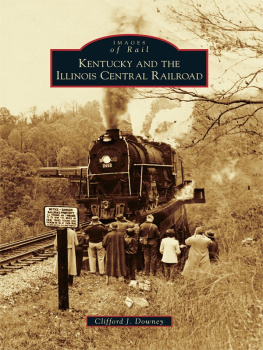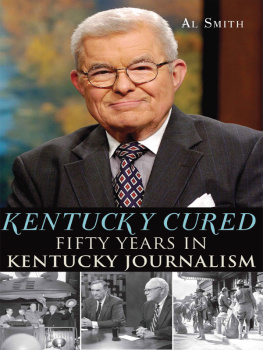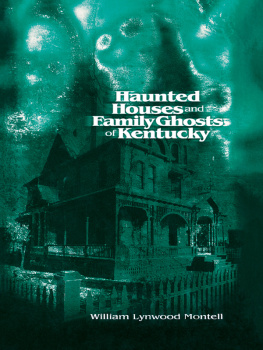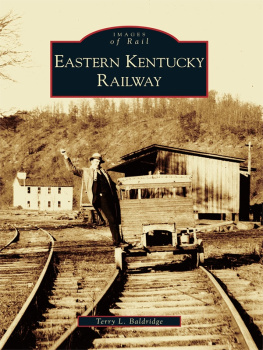David Connerley Nahm
Ancient Oceans of Central Kentucky
But who knows the fate of his bones, or how often he is to be buried?
Sir Thomas Browne, Urn Burial
PROLOGUE: THE CHILDRENS CHOIR
In Sundays lengthening shadows, neighborhood children lounge by the hip-high brick wall that surrounds the town cemetery and they tell strange stories to stall the nights trundle. Listen, they say. Wait, listen. Their neighborhood is boring and their houses are boring and their parents are boring. One points, saying, That grave is empty, and it is. Theyve heard all of these stories before at the end of a dark hall during a church lock-in, from cousins on a dock at the lake, in hushes between songs during choir practice, on walks home from school, during the roar of lunch, in the backseats of buses, over telephones with coiling cords tangling around wrists. And now, with the last exhalation of summer they tell them again.
My brother says
At the far end of the cemetery, there is a man lingering along the edge of the shadow cast by the maples. The children cackle and socks slip down ankles. They caw, guffawing, leaping and leaning, kicking stones to quell rushing blood and billows of nervous laughter. The man has stopped by a marble mausoleum and he just stands and watches the children. In the distance unseen cars pass and pop songs boom. They sneak glances to try and tell who it is standing behind the stones, but they never get a good look at him and later when they talk about it, they all remember something different. And then summer is gone before they know it and it is fall. Look, they say. Listen. Stories without end or ending. This was the first summer they spent listening to songs to which they are not allowed to listen. They holler out car windows at a pitiful-looking woman walking by the cemetery gate, filthy hair and grim face comically made-up. Their lungs rip with laughter and red cheeks wet. And then the fall is gone and the winter comes slinking in on the low sky. They dream of older brothers and sisters in growling cars, harrowing empty nights with windows down and radio squall like a pillar of fire into the night. They had cousins from the city spend a weekend teaching them how to dance, telling them about the girls and boys they knew who slipped out and stole through the night to throw rocks at the window of some possible love still slumbering. Maybe it will snow. Maybe it wont. Maybe the man can hear their voices and maybe he watches them slink in the sinking sunlight. The rain washes the names off of the old limestone markers and only the water rises heavenward again. During a caesura in their talk, they look up and the man is gone.
That grave is empty. They gasp and giggle and then, just like that, it is dark and they can no longer see each other and no longer hear the distant love songs of passing cars and a voice calls a name and they rise up, running toward home.
LEAH SHEPHERD DIDNT KNOW THE NAME OF the song the bald man in horn-rimmed glasses was singing to himself as he stared at her through the snow. She thought of the muffled songs of the cars that would pass outside of the windows of the bedroom she shared with her brother Jacob when they were children. The cars cresting the hill, headlights filling the bedroom for a moment with racing trapezoids of white and those brief harmonies as the cars doppler past and then silence again and dark. Sometimes she would hear a sliver of melody that she would recognize, but she was too young to know its name and it slipped from her mind as soon as the world outside their bedroom was still again.
The man stared down at her from a distance, backlit by his own headlights, and she had that feeling again, the melodys name just out of reach, and the air glittered around them.
Wind frisked through the trees, bending new branches and sending the light green leaves like ticker-tape to the ground of the woods behind the apartment building on the edge of Crow Station, Kentucky, where Leah Shepherd, the executive director of a nonprofit organization which provided emergency support services to low income women and children, lived. Her apartment: nine-hundred square feet, one bed, one bath, kitchen, open concept, $600/mo., good light, NO PETS.
She woke and stretched and dressed and drove to the old house that had been subdivided into offices in the small, damp downtown. The old house needed to be painted and needed the half-rotted wood handrails to be repaired, but the budget did not allow for these needs to be addressed this year and likely would not allow for them to be addressed next year either. Charitable giving was down. Federal and state funds were cut. Grants were scarce. The baseboards were separating from the floor and the carpet runners were threadbare. The chairs at the conference table were worn when donated years before by a law firm in town and were now, after several repairs, bordering on hazardous. There was a kitchen filled with mismatched plastic plates and stained coffee pots and non-dairy creamers of unknown vintage. Leah sat and listened and signed papers and took calls and drove back to the apartment as the blue sky faded and lowered.
Behind her apartment building there ran a stream and in the evenings Leah would walk in the woods that rose along the streams banks. She walked to try and lose the day, to lose the women and children shed seen sitting in the waiting room, to lose the tales of unpaid water bills and cut-off electricity and of bruises and wailing children and the giggling half-truths and sob stories and excuses and the hungry look on the quiet children that played with toys only donated to the nonprofit after they couldnt be sold at a yard sale quarters, dimes, nickels, nothing. She walked to lose all of this and water rushed over rocks, colorful garbage caught in fallen branches fluttered, bits of blue between bare branches, capering plastic tatters. Later, she slipped off her shoes by the door and slipped her dirty dishes into the empty sink while listening to the radio for company and though she thought that shed walked them all out of her mind, she remembered the letters shed signed and the arms shed touched and the grants that she needed to finish applying for and she rubbed her face and walked into her bedroom and undressed and got into bed and closed her eyes and it was all still with her.
In the mirror of the bathroom beneath the stairs at work, Leah straightened her blouse and catalogued the creases in her face that shed never really noticed before. On the telephone once, shed been asked to describe herself and had struggled to do so. The women came and waited to meet with her, their children swinging legs, bubbling with questions, begging to be taken to the toy store, to the ice cream shop, to the fair that will open that night. Broken spines of discarded books left open on empty seats. Leah smiled and listened and signed forms. She heard a woman tell her son that if he was good he could go and Leah turned and asked, Youre going to the fair? That sounds like so much fun. I havent been to a fair in forever. Are you excited? As she was saying this, she felt a tremor through her body. Shed not thought of the fair in decades and it rose electric before her, obscuring for a moment the childs face. The lights in Shaker frenzy and the thunderous din of voices and the smell of greasy food that seemed to have completely displaced the air itself. The child writhed and looked up at his mother for what he should say. Any good child has a natural fear of strange adults.
In meetings with her staff, she discussed possible sources of support, reviewed the increase in requests for help. Outside of the window of her office a tall woman with filthy hair walked by, but Leah, in a reverie, didnt notice her. The caw of the telephone on her desk, the red light of line three trilling, brought her back from wherever shed been and her hand went to the nape of her neck when the wind rattled the drafty windows of the old office or when it called to her through the trees. There was a birthmark in the shape of a crab underneath her hair, hidden by crimped tresses. In the meetings she nodded and sighed over the names and numbers. In the kitchen, late in the afternoon, the receptionist, a widow who boarded college students in a basement apartment, rank with mildew, said, as she poured a cup of decaf and cut a comically small piece of pound cake that someone had brought the day before, I didnt know you have a brother. Leah looked up from the window, startled, and said, He passed away. The receptionist apologized and said shed put a call through for Leahs voicemail, but must have misunderstood what the man said. When Leah returned to her office there wasnt any message.








